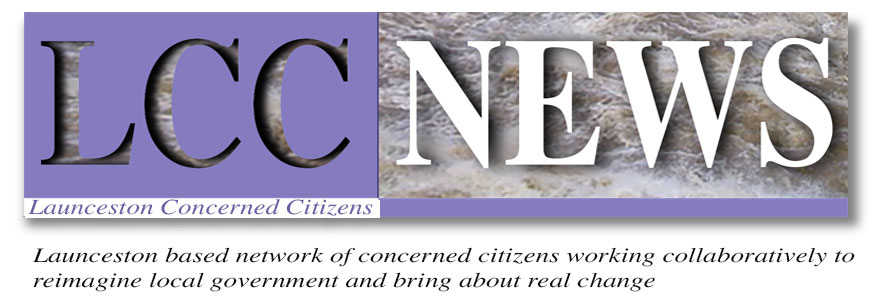PURPOSE:
To
achieve the repeal of the Tasmanian Local Government Act 1993 in order to
achieve greater efficiency and more effective outcomes.
OBJECTIVES:
- To achieve public acknowledgement of the Act’s inadequacies in a 21st C context relative to constituency representation and civic planning;
- To overcome the Act’s inbuilt shortfalls relative to aldermanic or councilor accountability within the Act;
- To overcome the precariousness of the distinctions drawn between the roles of governance and management;
- To advocate 21st C mechanisms that afford constituents greater access to decision making in Local Government
- To form networked alliance and auspicing arrangements with a broad spectrum of citizens groups and organisations;
- To advocate the reimagining of local governance and its planning role in ways that both enables and promotes sustainability.
- The Act’s inadequacies are due to the 20th C context within which it was framed and especially so in regard to constituency representation and civic planning;
- The Act has multiple shortfalls relative to aldermanic/councilor policy determination and accountability relative to contemporary circumstances and imperatives;
- The distinctions currently drawn between the roles of governance and management are blurred and blurrable which in turn mitigates against elected representatives accountability;
- The 21st C communication technologies and mechanisms now afford constituents greater direct access to decision making processes in respect to governance in a regional, ‘municipal’ and/or precinct context.
- Regional and local networks and alliances empower citizens and better enable them to operate effectively towards achieving targeted goals;
- Sustainable communities need to be serviced by affordable, effective and efficient administrations facilitated in new and innovative ways. Moreover, there is an ongoing imperative to proactively seek sustainable outcomes in the current paradigm of increasing and dynamic change.
- Articulate the Act’s inadequacies in the current 21st C and especially so in regard to constituency and civic planning imperatives via conferences, public meetings, the Internet, social media and crowdfunded advertisements;
- Articulate the Act’s shortfalls relative to aldermanic/councilor accountability imperative in contemporary circumstances and a climate of dynamic change via conferences, public meetings, the Internet, social media and crowdfunded advertisements;;
- Via the print-press submit and present discussion papers and open letters aimed at drawing clearer distinctions between the roles of governance, management and functional accountability;
- Employ 21st C current communication networks, technologies and mechanisms to promulgate change plus advocate the repeal and/or the reimagination of the Tasmanian Local Government Act 1993.
- Proactively establish alliances with regional and local networks to empower citizens and better enable them to operate effectively, and individually, towards achieving targeted short, medium and long term goals;
- Focus attention upon the future development of sustainable communities that are serviced by innovative, affordable, effective and efficient administrations.
- Proactively seek funding to support the network of network’s purpose and objectives.


No comments:
Post a Comment